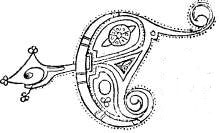
SECTION III.
Contracts and Wills in Ancient Ireland

ONTRACTS between individuals do not assume great importance among a people organised in clans until clan responsibility has begun to give place to the responsibility of individuals. The provisions of the clan system, coupled with the simple country life of our ancestors, left little occasion for contracts either of the commercial sort or under seal among them; and the same system so fully provided for the devolution of their property after their death that there was hardly any occasion for wills. In transferring property in goods, barter, which was far more extensively employed than true sale, was in general more conclusive and gave rise to fewer questions for legal decision. Contracts relating to land were not numerous. They could in general be made only with the concurrence of the sept and in the presence of a flaith of high rank called the Aire-forgaill. Some written contracts relating to land have been preserved, perhaps from the fourteenth century; but while other writings of apparently less private importance are carefully dated, these are without date.
It is at first sight strange that written contracts and wills were so little used among a people so addicted to writing on other subjects. The explanation is, that the clan system rendered them unnecessary. They were exceptional and foreign to that system, and while it continued in effective operation the amount of property affected by contracts and wills was probably not great. Nevertheless, some rules relating to wills are laid down in the Corus Bescna; and the Senchus Mor contains a good deal about contracts, from which it is clear that warranty on the sale of goods was well understood and frequently given and taken; and the importance of a valuable consideration, not generally recognised in English law until the last century, was perfectly well known in Ireland. Anything done without valuable consideration is described as done "for God's sake," and imposed a very slight if any legal obligation on the other party to it. From the expression frequently used that "Nothing is due without deserving it," we must infer that a valuable consideration was essential to the binding of a contract of any kind.
It also appears that to form a contract perfect and legally binding a witness was necessary, that this witness should in general be of the tribe of the party on whom the performance of the contract lay, that his status was an important legal element, and that by acting as witness he incurred the liabilities of a surety.
Many rules are given as to the times within which in different circumstances sales might be set aside. A contract of two sane adults, with knowledge and warranty, might, on fraud being discovered, be dissolved in twenty-four hours. Without knowledge and without warranty it might be dissolved for ten days after the fraud was discovered. In both cases the "knowledge" is that of the buyer. The law seems more concerned about the state of the buyer's mind at the time of the purchase than about that of the seller.
Ratification of contracts made by persons under subjection and therefore not fully entitled to contract was also well understood. "One is held to adopt what he does not repudiate after knowledge, having power."
From a passage I have quoted it would appear that, as in English law until recently, a married woman was merged in her husband while he lived, and could not be bound by any contract made by her. This, however, is subject to some qualification, for it is clear from other passages that a woman could contract, in the presence of her husband, to the amount of her own honour-price.
Few married women had either taste or occasion for asserting what are now called women's rights.
A boy was deemed to have no sense until he was seven years old, only half sense from seven to the end of his fifteenth year. Even after this period he had strictly no power to contract so long as he remained a member of his father's household; but if he did make a contract with his father's knowledge it was binding on the father unless promptly repudiated. If once ratified by the father it was treated as his contract.
Monks on becoming such lost the capacity of contracting; but a monk who became abbot, or was appointed to manage the temporal affairs of his community, was allowed to contract on behalf of the community.
The non-free had very meagre powers of contracting, and the lowest grade of them had none at all.

